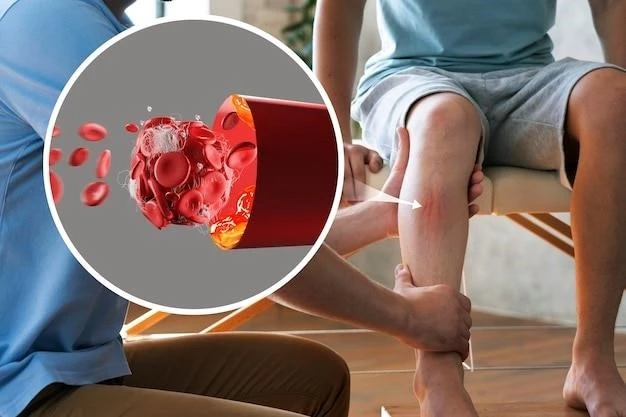Understanding Autoimmune Peripheral Neuropathy
Causes of Autoimmune Peripheral Neuropathy
Autoimmune peripheral neuropathy is caused by the immune system mistakenly attacking the peripheral nerves․ This abnormal immune response can be triggered by various factors, including genetic predisposition, viral infections, autoimmune disorders like rheumatoid arthritis or lupus, exposure to toxins, and certain medications; Specific antibodies may also play a role in damaging the nerves․
Identifying the underlying cause of autoimmune peripheral neuropathy can help in determining the most effective treatment․ Consult with a healthcare provider to discuss your symptoms, medical history, and any potential risk factors that may contribute to the development of this condition․ Through proper evaluation and diagnostic tests, healthcare professionals can work towards managing the autoimmune response and alleviating symptoms associated with peripheral neuropathy․
Symptoms and Diagnosis of Autoimmune Peripheral Neuropathy
Autoimmune peripheral neuropathy can present with a range of symptoms, including numbness, tingling, weakness, and pain in the hands and feet․ Other common signs may include muscle fatigue, muscle atrophy, and difficulty with coordination or balance․ In severe cases, individuals may experience paralysis or difficulty walking․
Diagnosing autoimmune peripheral neuropathy involves a thorough evaluation by a healthcare provider․ This process may include a physical examination, nerve conduction studies, electromyography, blood tests to check for specific antibodies, and imaging tests like MRIs․ Due to the complex nature of autoimmune neuropathies, a multidisciplinary approach involving neurologists, immunologists, and other specialists may be necessary to accurately diagnose and develop a comprehensive treatment plan tailored to the individual’s needs․
Treatment Options for Autoimmune Peripheral Neuropathy
When it comes to treating autoimmune peripheral neuropathy, the goal is to manage symptoms, slow down the progression of nerve damage, and improve overall quality of life․ Treatment approaches may include⁚
- Immunosuppressive Therapy⁚ Medications that suppress the immune system’s abnormal response․
- Intravenous Immunoglobulin (IVIG)⁚ Infusions of antibodies to modulate the immune response․
- Corticosteroids⁚ Anti-inflammatory drugs that can help reduce nerve inflammation․
- Plasma Exchange⁚ A procedure to remove harmful antibodies from the blood․
- Pain Management⁚ Medications, physical therapy, and alternative therapies to address neuropathic pain․
It is essential to work closely with healthcare providers to determine the most suitable treatment plan based on individual symptoms, medical history, and response to therapy․ Regular monitoring and adjustments to the treatment regimen may be necessary to effectively manage autoimmune peripheral neuropathy and promote optimal nerve function․
Lifestyle Management with Autoimmune Peripheral Neuropathy
Adopting healthy lifestyle habits can complement medical treatment and help individuals with autoimmune peripheral neuropathy manage their condition effectively․ Here are some lifestyle management tips⁚
- Regular Exercise⁚ Engage in low-impact activities like walking, swimming, or yoga to improve circulation and maintain muscle strength․
- Healthy Diet⁚ Eat a well-balanced diet rich in fruits, vegetables, whole grains, and lean proteins to support nerve health and overall well-being․
- Manage Stress⁚ Practice relaxation techniques such as deep breathing, meditation, or mindfulness to reduce stress levels that can exacerbate symptoms․
- Avoid Toxins⁚ Minimize exposure to environmental toxins and chemicals that may worsen nerve damage․
- Proper Foot Care⁚ Inspect feet daily, wear comfortable shoes, and manage any foot injuries promptly to prevent complications․
By incorporating these lifestyle modifications into daily routines, individuals with autoimmune peripheral neuropathy can enhance their quality of life, alleviate symptoms, and promote overall health and well-being․ Consult healthcare providers for personalized advice on lifestyle strategies tailored to your specific needs and condition․
Research Updates on Autoimmune Peripheral Neuropathy
Staying informed about the latest research developments in autoimmune peripheral neuropathy is crucial for both patients and healthcare providers․ Recent advancements in research have focused on⁚
- Genetic Studies⁚ Investigating genetic factors that contribute to autoimmune neuropathies to enhance understanding and personalized treatment approaches․
- Biomarker Identification⁚ Identifying specific biomarkers that can aid in early diagnosis and monitoring disease progression․
- Immunotherapy Advances⁚ Developing new immunotherapies that target the immune response more specifically, reducing side effects and improving efficacy․
- Regenerative Medicine⁚ Exploring stem cell therapy and other regenerative approaches to repair nerve damage and restore function․
Engaging with healthcare professionals and participating in clinical trials can provide access to cutting-edge treatments and contribute to the advancement of knowledge in autoimmune peripheral neuropathy․ Patients are encouraged to inquire about research updates during medical appointments and to explore opportunities to be part of research studies aimed at improving outcomes for individuals with this condition․
Autoimmune Peripheral Neuropathy in Children
Autoimmune peripheral neuropathy can also affect children, although less commonly than adults․ In pediatric cases, recognizing symptoms early and seeking prompt medical attention is crucial for effective management․ Parents and caregivers can play a vital role in supporting children with autoimmune peripheral neuropathy by⁚
- Communication⁚ Encouraging open communication with healthcare providers to address concerns and optimize treatment plans․
- Monitoring Symptoms⁚ Keeping track of the child’s symptoms and reporting any changes to the healthcare team promptly․
- Emotional Support⁚ Providing emotional support, reassurance, and a positive environment to help the child cope with the challenges of the condition․
- Educational Advocacy⁚ Working with school administrators and teachers to ensure accommodations are in place to support the child’s education․
- Promoting Healthy Habits⁚ Encouraging a balanced diet, regular exercise, and adherence to treatment to promote overall well-being․
It is essential for families to collaborate closely with healthcare professionals to tailor a comprehensive care plan that addresses the unique needs of the child with autoimmune peripheral neuropathy․ By fostering a supportive and informed environment, children can effectively manage their condition and thrive despite the challenges it may present․
Coping Strategies for Autoimmune Peripheral Neuropathy
Living with autoimmune peripheral neuropathy can present challenges, but implementing coping strategies can help individuals effectively manage their condition and improve their quality of life․ Here are some strategies to consider⁚
- Support Groups⁚ Joining support groups or connecting with others facing similar challenges can provide emotional support, tips, and encouragement․
- Mind-Body Techniques⁚ Incorporating relaxation techniques like yoga, meditation, or deep breathing exercises can help reduce stress and manage symptoms․
- Adaptive Devices⁚ Utilizing assistive devices such as braces, orthotics, canes, or ergonomic tools can enhance mobility and function․
- Healthy Lifestyle⁚ Maintaining a balanced diet, staying physically active within limits, and getting enough rest can promote overall well-being․
- Positive Mindset⁚ Focusing on aspects of life that bring joy, practicing gratitude, and staying optimistic can improve resilience and mental well-being․
By incorporating these coping strategies into daily routines and seeking professional support when needed, individuals with autoimmune peripheral neuropathy can navigate challenges more effectively and maintain a fulfilling lifestyle․ Consulting with healthcare providers and mental health professionals can offer personalized guidance to develop a holistic approach to coping with the impacts of autoimmune peripheral neuropathy․
Prevention of Autoimmune Peripheral Neuropathy
While autoimmune peripheral neuropathy cannot always be prevented, certain measures may help reduce the risk of developing or exacerbating the condition․ Consider the following preventive strategies⁚

- Maintain a Healthy Lifestyle⁚ Eating a nutritious diet, engaging in regular exercise, and avoiding harmful habits like smoking can support overall well-being․
- Manage Underlying Conditions⁚ Properly managing autoimmune disorders, infections, and chronic diseases can help prevent complications that may lead to neuropathy․
- Limit Toxin Exposure⁚ Minimize exposure to toxins, chemicals, and environmental hazards that can potentially trigger autoimmune responses․
- Regular Medical Check-Ups⁚ Routine health screenings and regular visits to healthcare providers can help detect early signs of neuropathy or underlying conditions․
- Stress Management⁚ Practice stress-reducing techniques such as mindfulness, yoga, or meditation to lower stress levels that can impact the immune system․
While not all cases of autoimmune peripheral neuropathy can be prevented, incorporating these preventive measures into your lifestyle can contribute to overall health and potentially reduce the risk of developing autoimmune-related nerve damage․ Consult with healthcare professionals for personalized advice on preventive strategies based on your medical history and individual risk factors․
